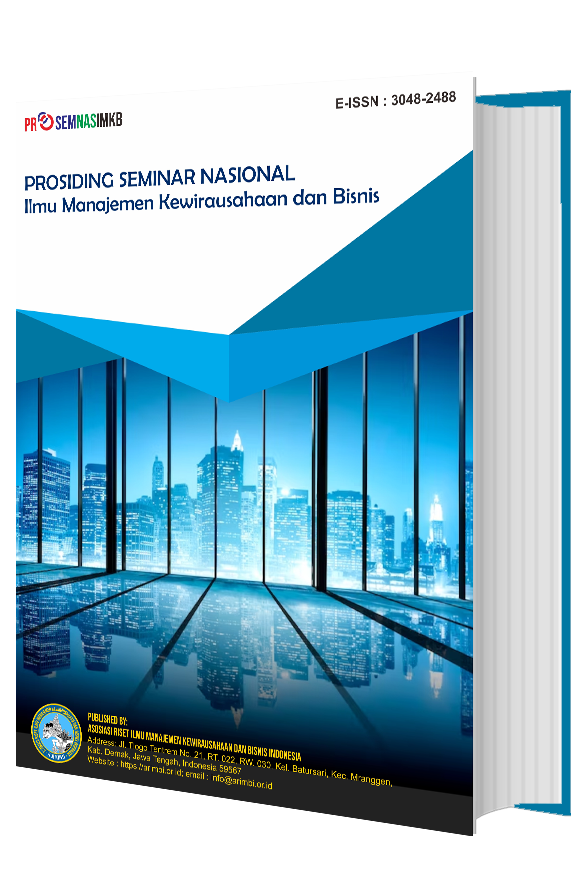Persepsi Konsumen terhadap Fasilitas Makanan dan Minuman serta Operasional Hotel Syariah di Jabodetabek
DOI:
https://doi.org/10.61132/prosemnasimkb.v2i1.286Keywords:
Consumer Perceptions, Halal Food and Beverage Facilities, Halal Tourism, Sharia-based Operations, Sharia-compliant HotelsAbstract
Halal tourism has continued to grow as a highly attractive segment for Muslim travelers, particularly in the provision of Sharia-compliant accommodation such as Islamic hotels. This study aims to examine consumer perceptions of halal food-and-beverage facilities and Sharia-based operational standards in Islamic hotels across the Greater Jakarta area (Jabodetabek). A descriptive quantitative approach was employed, involving 150 respondents who had stayed in Sharia hotels. Data were collected through closed-ended Likert-scale questionnaires and analyzed using the Weighted Mean Score (WMS) technique to evaluate respondents’ assessments of each indicator. The results indicate that consumer perception of halal food-and-beverage facilities falls into the very high category, with average scores exceeding 4.838. Consumers acknowledged that Sharia hotels maintain halal assurance, hygiene, and food safety through proper processing and the availability of halal certification. Regarding operational aspects, consumer perception is also classified as very good, with an average score of 4.606, particularly for policies prohibiting unmarried couples from sharing a room and banning entertainment deemed inappropriate or immoral. However, the use of Sharia-compliant financial institutions still requires improvement. Overall, the findings affirm that Sharia hotels in Jabodetabek have successfully implemented most Sharia principles, although further enhancement of internal operational practices is needed to achieve more comprehensive Sharia compliance.
Downloads
References
Al-Qaradawi, Y. (1999). The lawful and the prohibited in Islam. Al-Falah Foundation.
Badan Pusat Statistik. (2022). Statistik wisatawan mancanegara dan domestik Indonesia 2020–2021. BPS.
Battour, M., & Ismail, M. N. (2016). Halal tourism: Concepts, practices, challenges and future. Tourism Management Perspectives, 19, 150–154. https://doi.org/10.1016/j.tmp.2016.01.004
Dewan Syariah Nasional Majelis Ulama Indonesia. (2016). Fatwa DSN-MUI No. 108/2016 tentang pedoman penyelenggaraan pariwisata berdasarkan prinsip syariah. DSN-MUI.
El-Gohary, H. (2016). Halal tourism, is it really halal? Tourism Management Perspectives, 19, 124–130. https://doi.org/10.1016/j.tmp.2016.01.002
Henderson, J. C. (2010). Sharia-compliant hotels. Tourism and Hospitality Research, 10(3), 246–254. https://doi.org/10.1057/thr.2010.15
Henderson, J. C. (2016). Halal food, certification and halal tourism: Insights from Malaysia and Singapore. Tourism Management Perspectives, 19, 160–164. https://doi.org/10.1016/j.tmp.2016.02.004
Iranmanesh, M., Moghavvemi, S., Zailani, S., & Hyun, S. S. (2019). The role of halal food availability in destination competitiveness: Muslim travelers’ perspectives. Journal of Islamic Marketing, 10(1), 10–25. https://doi.org/10.1108/JIMA-04-2017-0054
Neuman, W. L. (2014). Social research methods: Qualitative and quantitative approaches (7th ed.). Pearson Education Limited.
Razalli, M. R., Abdullah, S., & Hassan, M. G. (2012). Developing a model for Islamic hotels: Evaluating opportunities and challenges. International Journal of Business and Management Studies, 4(2), 25–37.
Samori, Z., & Sabtu, N. (2014). Developing halal standard for Malaysian hotel industry: An exploratory study. Procedia - Social and Behavioral Sciences, 121, 144–157. https://doi.org/10.1016/j.sbspro.2014.01.115
Sobari, N., Nugroho, A., & Nugrahani, D. (2017). Sharia compliance and consumer trust in Islamic hotels. Journal of Islamic Marketing, 8(3), 387–402. https://doi.org/10.1108/JIMA-11-2015-0076
Sugiyono. (2019). Metode penelitian kuantitatif, kualitatif, dan R&D. Alfabeta.
Sulaiman, N., Hasan, H., & Rahman, F. (2021). Facility and design attributes of sharia-compliant hotels: Influence on Muslim tourists’ perception. Journal of Tourism and Hospitality Management, 9(1), 12–24. https://doi.org/10.17265/2328-2169/2021.01.002
Wright, W., & Annes, A. (2013). Halal tourism, cultural identity and globalization. Journal of Cultural Geography, 30(3), 1–20. https://doi.org/10.1080/08873631.2013.823493
Yousaf, S., & Xiucheng, F. (2018). Halal food: A gateway to the contemporary Muslim consumer. Journal of Islamic Marketing, 9(3), 1–20. https://doi.org/10.1108/JIMA-05-2016-0042
Zailani, S., Iranmanesh, M., Aziz, A. A., & Kanapathy, K. (2019). Halal logistics: Practices and performance. Journal of Islamic Marketing, 10(1), 1–15. https://doi.org/10.1108/JIMA-03-2017-0046
Downloads
Published
How to Cite
Issue
Section
License
Copyright (c) 2025 Prosiding Seminar Nasional Ilmu Manajemen Kewirausahaan dan Bisnis

This work is licensed under a Creative Commons Attribution-ShareAlike 4.0 International License.






